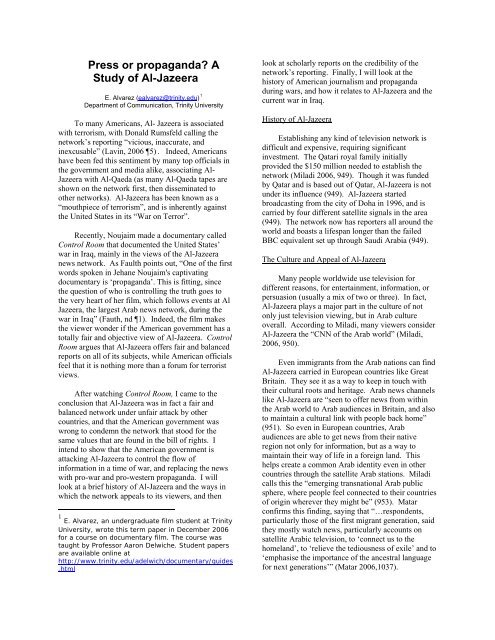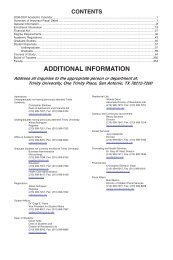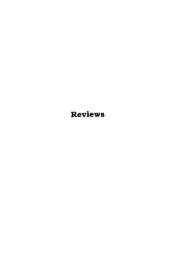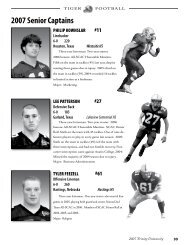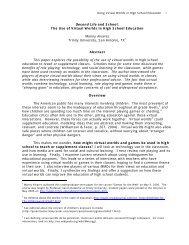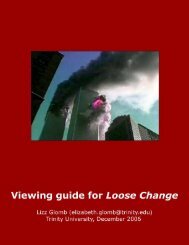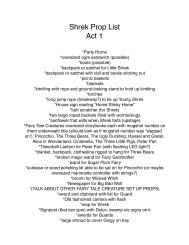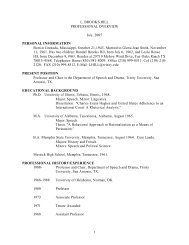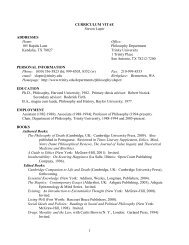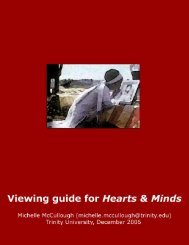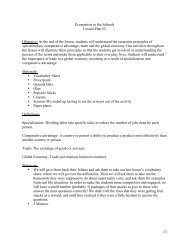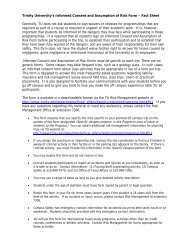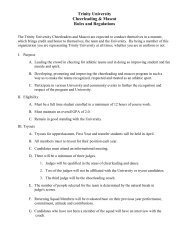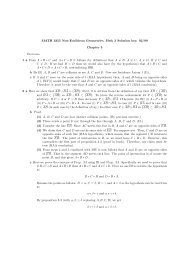Press or propaganda? A study of Al-Jazeera - Trinity University
Press or propaganda? A study of Al-Jazeera - Trinity University
Press or propaganda? A study of Al-Jazeera - Trinity University
You also want an ePaper? Increase the reach of your titles
YUMPU automatically turns print PDFs into web optimized ePapers that Google loves.
<strong>Press</strong> <strong>or</strong> <strong>propaganda</strong>? A<br />
Study <strong>of</strong> <strong>Al</strong>-<strong>Jazeera</strong><br />
E. <strong>Al</strong>varez (ealvarez@trinity.edu) 1<br />
Department <strong>of</strong> Communication, <strong>Trinity</strong> <strong>University</strong><br />
To many Americans, <strong>Al</strong>- <strong>Jazeera</strong> is associated<br />
with terr<strong>or</strong>ism, with Donald Rumsfeld calling the<br />
netw<strong>or</strong>k’s rep<strong>or</strong>ting “vicious, inaccurate, and<br />
inexcusable” (Lavin, 2006 5) . Indeed, Americans<br />
have been fed this sentiment by many top <strong>of</strong>ficials in<br />
the government and media alike, associating <strong>Al</strong>-<br />
<strong>Jazeera</strong> with <strong>Al</strong>-Qaeda (as many <strong>Al</strong>-Qaeda tapes are<br />
shown on the netw<strong>or</strong>k first, then disseminated to<br />
other netw<strong>or</strong>ks). <strong>Al</strong>-<strong>Jazeera</strong> has been known as a<br />
“mouthpiece <strong>of</strong> terr<strong>or</strong>ism”, and is inherently against<br />
the United States in its “War on Terr<strong>or</strong>”.<br />
Recently, Noujaim made a documentary called<br />
Control Room that documented the United States’<br />
war in Iraq, mainly in the views <strong>of</strong> the <strong>Al</strong>-<strong>Jazeera</strong><br />
news netw<strong>or</strong>k. As Faulth points out, “One <strong>of</strong> the first<br />
w<strong>or</strong>ds spoken in Jehane Noujaim's captivating<br />
documentary is ‘<strong>propaganda</strong>’. This is fitting, since<br />
the question <strong>of</strong> who is controlling the truth goes to<br />
the very heart <strong>of</strong> her film, which follows events at <strong>Al</strong><br />
<strong>Jazeera</strong>, the largest Arab news netw<strong>or</strong>k, during the<br />
war in Iraq” (Fauth, nd 1). Indeed, the film makes<br />
the viewer wonder if the American government has a<br />
totally fair and objective view <strong>of</strong> <strong>Al</strong>-<strong>Jazeera</strong>. Control<br />
Room argues that <strong>Al</strong>-<strong>Jazeera</strong> <strong>of</strong>fers fair and balanced<br />
rep<strong>or</strong>ts on all <strong>of</strong> its subjects, while American <strong>of</strong>ficials<br />
feel that it is nothing m<strong>or</strong>e than a f<strong>or</strong>um f<strong>or</strong> terr<strong>or</strong>ist<br />
views.<br />
After watching Control Room, I came to the<br />
conclusion that <strong>Al</strong>-<strong>Jazeera</strong> was in fact a fair and<br />
balanced netw<strong>or</strong>k under unfair attack by other<br />
countries, and that the American government was<br />
wrong to condemn the netw<strong>or</strong>k that stood f<strong>or</strong> the<br />
same values that are found in the bill <strong>of</strong> rights. I<br />
intend to show that the American government is<br />
attacking <strong>Al</strong>-<strong>Jazeera</strong> to control the flow <strong>of</strong><br />
inf<strong>or</strong>mation in a time <strong>of</strong> war, and replacing the news<br />
with pro-war and pro-western <strong>propaganda</strong>. I will<br />
look at a brief hist<strong>or</strong>y <strong>of</strong> <strong>Al</strong>-<strong>Jazeera</strong> and the ways in<br />
which the netw<strong>or</strong>k appeals to its viewers, and then<br />
1 E. <strong>Al</strong>varez, an undergraduate film student at <strong>Trinity</strong><br />
<strong>University</strong>, wrote this term paper in December 2006<br />
f<strong>or</strong> a course on documentary film. The course was<br />
taught by Pr<strong>of</strong>ess<strong>or</strong> Aaron Delwiche. Student papers<br />
are available online at<br />
http://www.trinity.edu/adelwich/documentary/guides<br />
.html<br />
look at scholarly rep<strong>or</strong>ts on the credibility <strong>of</strong> the<br />
netw<strong>or</strong>k’s rep<strong>or</strong>ting. Finally, I will look at the<br />
hist<strong>or</strong>y <strong>of</strong> American journalism and <strong>propaganda</strong><br />
during wars, and how it relates to <strong>Al</strong>-<strong>Jazeera</strong> and the<br />
current war in Iraq.<br />
Hist<strong>or</strong>y <strong>of</strong> <strong>Al</strong>-<strong>Jazeera</strong><br />
Establishing any kind <strong>of</strong> television netw<strong>or</strong>k is<br />
difficult and expensive, requiring significant<br />
investment. The Qatari royal family initially<br />
provided the $150 million needed to establish the<br />
netw<strong>or</strong>k (Miladi 2006, 949). Though it was funded<br />
by Qatar and is based out <strong>of</strong> Qatar, <strong>Al</strong>-<strong>Jazeera</strong> is not<br />
under its influence (949). <strong>Al</strong>-<strong>Jazeera</strong> started<br />
broadcasting from the city <strong>of</strong> Doha in 1996, and is<br />
carried by four different satellite signals in the area<br />
(949). The netw<strong>or</strong>k now has rep<strong>or</strong>ters all around the<br />
w<strong>or</strong>ld and boasts a lifespan longer than the failed<br />
BBC equivalent set up through Saudi Arabia (949).<br />
The Culture and Appeal <strong>of</strong> <strong>Al</strong>-<strong>Jazeera</strong><br />
Many people w<strong>or</strong>ldwide use television f<strong>or</strong><br />
different reasons, f<strong>or</strong> entertainment, inf<strong>or</strong>mation, <strong>or</strong><br />
persuasion (usually a mix <strong>of</strong> two <strong>or</strong> three). In fact,<br />
<strong>Al</strong>-<strong>Jazeera</strong> plays a maj<strong>or</strong> part in the culture <strong>of</strong> not<br />
only just television viewing, but in Arab culture<br />
overall. Acc<strong>or</strong>ding to Miladi, many viewers consider<br />
<strong>Al</strong>-<strong>Jazeera</strong> the “CNN <strong>of</strong> the Arab w<strong>or</strong>ld” (Miladi,<br />
2006, 950).<br />
Even immigrants from the Arab nations can find<br />
<strong>Al</strong>-<strong>Jazeera</strong> carried in European countries like Great<br />
Britain. They see it as a way to keep in touch with<br />
their cultural roots and heritage. Arab news channels<br />
like <strong>Al</strong>-<strong>Jazeera</strong> are “seen to <strong>of</strong>fer news from within<br />
the Arab w<strong>or</strong>ld to Arab audiences in Britain, and also<br />
to maintain a cultural link with people back home”<br />
(951). So even in European countries, Arab<br />
audiences are able to get news from their native<br />
region not only f<strong>or</strong> inf<strong>or</strong>mation, but as a way to<br />
maintain their way <strong>of</strong> life in a f<strong>or</strong>eign land. This<br />
helps create a common Arab identity even in other<br />
countries through the satellite Arab stations. Miladi<br />
calls this the “emerging transnational Arab public<br />
sphere, where people feel connected to their countries<br />
<strong>of</strong> <strong>or</strong>igin wherever they might be” (953). Matar<br />
confirms this finding, saying that “…respondents,<br />
particularly those <strong>of</strong> the first migrant generation, said<br />
they mostly watch news, particularly accounts on<br />
satellite Arabic television, to ‘connect us to the<br />
homeland’, to ‘relieve the tediousness <strong>of</strong> exile’ and to<br />
‘emphasise the imp<strong>or</strong>tance <strong>of</strong> the ancestral language<br />
f<strong>or</strong> next generations’” (Matar 2006,1037).
But what is it about an Arab news channel that<br />
can carry so much cultural significance? I’m sure<br />
that if Americans were to live abroad, they would not<br />
long so much f<strong>or</strong> CNN if they had access to other<br />
credible news stations. Civil liberties aren’t<br />
necessarily guaranteed in all <strong>of</strong> the countries in the<br />
Middle East, so free programming is a representation<br />
<strong>of</strong> freedoms that people long f<strong>or</strong>. Miladi talks about<br />
the appeal <strong>of</strong> <strong>Al</strong>-<strong>Jazeera</strong>, explaining that “Its<br />
programmes appeal to a hunger within Arab<br />
audiences f<strong>or</strong> democracy and freedom <strong>of</strong> expression,<br />
suppressed by decades <strong>of</strong> state control on all media<br />
outlets in most Arab countries, with a few exceptions<br />
such as Lebanon” (Miladi 2006, 952). So, to Arab<br />
audiences, <strong>Al</strong>-<strong>Jazeera</strong> stands not f<strong>or</strong> terr<strong>or</strong>ism and<br />
<strong>propaganda</strong>, but instead is an expression <strong>of</strong><br />
democratic ideals, showing a longing f<strong>or</strong> the<br />
freedoms that Americans find in everyday news<br />
programming.<br />
It would appear that <strong>Al</strong>-<strong>Jazeera</strong> is a leader <strong>of</strong> the<br />
discourse <strong>of</strong> freedoms and Arab culture. To Arabs,<br />
“<strong>Al</strong>-<strong>Jazeera</strong> is perceived as filling this gap and thus<br />
plays an imp<strong>or</strong>tant role in broadening the debate<br />
about what should be broadcast in terms <strong>of</strong> news<br />
from an Arab perspective, and what should be<br />
discussed in relation to the concerns <strong>of</strong> Arab people.<br />
This opens the do<strong>or</strong> to greater freedom <strong>of</strong> expression<br />
in its broadest sense” (959). While other countries<br />
might use state-run netw<strong>or</strong>ks to express government<br />
views, <strong>Al</strong>-<strong>Jazeera</strong> is seen as a genuine Arab product<br />
free from governmental influence.<br />
It would seem that it would be in America’s best<br />
interest to supp<strong>or</strong>t <strong>Al</strong>-<strong>Jazeera</strong> if America wants to<br />
win the media war in the Middle East, as <strong>Al</strong>-<strong>Jazeera</strong><br />
stands f<strong>or</strong> the values that the United States is trying<br />
to almost artificially install in the region. <strong>Al</strong>-<strong>Jazeera</strong><br />
could be used as a catalyst f<strong>or</strong> the people to get used<br />
to the freedoms <strong>of</strong> a democratic society. Hist<strong>or</strong>ically,<br />
“<strong>Al</strong>-<strong>Jazeera</strong> has been viewed as promoting debates on<br />
human rights and democracy, exposing political<br />
c<strong>or</strong>ruption, and to a large extent has ‘raised the<br />
ceiling <strong>of</strong> political and social debate throughout the<br />
Arab w<strong>or</strong>ld’, hence explicitly advocating and<br />
preparing the pan-Arab public f<strong>or</strong> democratic<br />
change” (959). Indeed, these are the very same<br />
values and expectations <strong>of</strong> an American free press<br />
that is enjoyed within this country.<br />
As I have shown, <strong>Al</strong>-<strong>Jazeera</strong> is considered by<br />
many to be a free and democratic netw<strong>or</strong>k, but is<br />
concerned with the issues facing the Arab nations.<br />
Some countries might confuse this with having a<br />
certain bias in news covering issues facing conflicts<br />
with the West. But, as it is pointed out, Eastern and<br />
Western news netw<strong>or</strong>ks have “the deepest imaginable<br />
cultural differences” and thus target their points<br />
“subtly <strong>or</strong> blatantly, to the biases <strong>of</strong> their discrete<br />
audiences” (Hickey 2002, 43). So <strong>Al</strong>-<strong>Jazeera</strong> will<br />
target Arab audiences with issues imp<strong>or</strong>tant to them<br />
while Western journalists might cover a different side<br />
<strong>of</strong> the same issue. But this is m<strong>or</strong>e due to cultural<br />
differences <strong>of</strong> their definable audience, not<br />
necessarily as a blatant bias. While subtle biases may<br />
exist (can any rep<strong>or</strong>ting ever be truly unbiased?), it<br />
would be wrong to say that this means that <strong>Al</strong>-<br />
<strong>Jazeera</strong> is against the Western countries and their<br />
policies, <strong>or</strong> that they are less credible f<strong>or</strong> covering<br />
different st<strong>or</strong>ies. They are simply covering issues<br />
imp<strong>or</strong>tant to their audience.<br />
The Credibility <strong>of</strong> <strong>Al</strong>-<strong>Jazeera</strong><br />
U.S. government <strong>of</strong>ficials have blasted <strong>Al</strong>-<br />
<strong>Jazeera</strong> as being a biased, <strong>Al</strong>-Qaeda mouthpiece with<br />
no legitimate news (Associated <strong>Press</strong>, 2006 7).<br />
However, acc<strong>or</strong>ding to many sources- Arab and<br />
Western alike- <strong>Al</strong>-<strong>Jazeera</strong> is just a credible news<br />
source as any other news netw<strong>or</strong>k, if not m<strong>or</strong>e so.<br />
F<strong>or</strong> example, in the opening days <strong>of</strong> the war in<br />
Afghanistan and Iraq many Arabs watched CNN and<br />
BBC news. But as Matar describes, “In subsequent<br />
days, however, many favoured Arabic channels, such<br />
as <strong>Al</strong>-<strong>Jazeera</strong>, f<strong>or</strong> their m<strong>or</strong>e varied analyses and<br />
wider range <strong>of</strong> viewpoints, including people ‘outside<br />
the loop’ <strong>of</strong> the mainstream Western media” (Matar<br />
2006, 1031). This shows that many people in the<br />
vicinity <strong>of</strong> the action thought <strong>Al</strong>-<strong>Jazeera</strong>’s coverage<br />
was on par if not superi<strong>or</strong> to the Western netw<strong>or</strong>ks, <strong>or</strong><br />
was just m<strong>or</strong>e relevant to their lives by being<br />
regionally close. Matar found that respondents to her<br />
<strong>study</strong> frequently stated that “We find in <strong>Al</strong>-<strong>Jazeera</strong> a<br />
way to vent our feelings and emotions. It is the most<br />
objective and balanced <strong>of</strong> all the channels…” (1032).<br />
It is apparent that many Middle Eastern people<br />
watch <strong>Al</strong>-<strong>Jazeera</strong> because they feel that the news<br />
coverage is m<strong>or</strong>e accurate and relevant to their<br />
region. Miladi summarizes this best, saying<br />
<strong>Al</strong>-<strong>Jazeera</strong> is successful because it<br />
covers the kind <strong>of</strong> topics that<br />
others do not: everything from<br />
human rights abuse in the Arab<br />
countries and debates about<br />
democracy, to women’s rights in<br />
Islam and the Palestinian intifadah,<br />
with wide coverage <strong>of</strong> uncens<strong>or</strong>ed<br />
news and current affairs from<br />
around the w<strong>or</strong>ld, debate<br />
programmes, special
documentaries, and one-on-one<br />
interviews with personalities <strong>of</strong><br />
opposed opinions, most <strong>of</strong> whom<br />
would not get a hearing on any<br />
other Arab station (Miladi 2006,<br />
952).<br />
It is not hard to imagine that Western news<br />
netw<strong>or</strong>ks would hardly if ever run lengthy st<strong>or</strong>ies<br />
about Arab democracy, debates, and other things that<br />
most in the region would find newsw<strong>or</strong>thy. Instead<br />
<strong>of</strong> seeing <strong>Al</strong>-<strong>Jazeera</strong> as an agenda setter, many Arabs<br />
find that it is the voice <strong>of</strong> the Middle East, talking<br />
about issues they want to hear about.<br />
As stated above, it can be argued that <strong>Al</strong>-<strong>Jazeera</strong><br />
is a m<strong>or</strong>e credible news source in the Middle East<br />
than conventional news sources because <strong>Al</strong>-<strong>Jazeera</strong> is<br />
stationed out <strong>of</strong> the Middle East. F<strong>or</strong> example, <strong>Al</strong>-<br />
<strong>Jazeera</strong> was allowed to stay in Afghanistan during the<br />
first days <strong>of</strong> the war even though the Taliban kicked<br />
out all other Western journalists, based on the fact<br />
that they were used to the netw<strong>or</strong>k’s presence in the<br />
region (Hickey 2002, 40). It is obvious that a<br />
rep<strong>or</strong>ter who is stationed in the country itself would<br />
be m<strong>or</strong>e credible than a rep<strong>or</strong>ter exiled to the b<strong>or</strong>ders<br />
rep<strong>or</strong>ting <strong>of</strong>f <strong>of</strong> speculations (and perhaps even<br />
secretly rep<strong>or</strong>ting from <strong>Al</strong>-<strong>Jazeera</strong> sources).<br />
Some even find <strong>Al</strong>-<strong>Jazeera</strong> a credible netw<strong>or</strong>k<br />
not only in the Middle East but abroad as well. F<strong>or</strong><br />
example, many people <strong>of</strong> Arab descent who live in<br />
Western countries like to watch news about the<br />
Israel-Palestinian conflict, but complain <strong>of</strong> the<br />
Western netw<strong>or</strong>ks’ focus on Israeli suffering. So<br />
many will watch <strong>Al</strong>-<strong>Jazeera</strong> to hear the other side <strong>of</strong><br />
the st<strong>or</strong>y, and find the coverage “… m<strong>or</strong>e credible<br />
and truthful version <strong>of</strong> the events and their aftermath”<br />
(Matar 2006, 1028). So ironically it is not <strong>Al</strong>-<strong>Jazeera</strong><br />
that gives unbalanced rep<strong>or</strong>ts, but rather the news<br />
sources <strong>of</strong> the very government that is accusing <strong>Al</strong>-<br />
<strong>Jazeera</strong> <strong>of</strong> being unbalanced and not credible.<br />
Instead <strong>of</strong> <strong>Al</strong>-<strong>Jazeera</strong> being the source <strong>of</strong> <strong>propaganda</strong>,<br />
it is possible that there is <strong>propaganda</strong> from some<br />
source about <strong>Al</strong>-<strong>Jazeera</strong> itself.<br />
Propaganda<br />
Many are familiar with classic war <strong>propaganda</strong>,<br />
with images <strong>of</strong> Rosie the Riveter, Uncle Sam, and<br />
scathing attacks on the Germans and Japanese. These<br />
images helped unite Americans against a common<br />
enemy, and inspired all to give their best f<strong>or</strong> their<br />
country. But <strong>propaganda</strong> during wartime can be<br />
dangerous as well. Acc<strong>or</strong>ding to Harrop’s <strong>study</strong> <strong>of</strong><br />
war <strong>propaganda</strong>, “The implications <strong>of</strong> unchecked war<br />
<strong>propaganda</strong> are far-reaching. It limits the availability<br />
<strong>of</strong> facts, context and the transparency <strong>of</strong> political<br />
motivations—prerequisites f<strong>or</strong> an inf<strong>or</strong>med<br />
citizenship, able to fully participate in democratic<br />
processes” (Harrop 2002, 311). In essence, war<br />
<strong>propaganda</strong> can go against the very democratic<br />
values that America battles f<strong>or</strong>, limiting voices<br />
(especially dissenting voices) and the facts needed to<br />
make an intelligent decision. Basically, the<br />
government can silence all voices except f<strong>or</strong> the preapproved<br />
ideas under the guise <strong>of</strong> patriotism.<br />
As Harrop points out, “This silence can be<br />
achieved through a variety <strong>of</strong> means, including progovernment<br />
media refusing access to min<strong>or</strong>ities <strong>or</strong><br />
via self-cens<strong>or</strong>ship, f<strong>or</strong> example, from fear <strong>of</strong> losing<br />
one’s job <strong>or</strong> social standing” (311). Thus, not only<br />
does the government itself make and end<strong>or</strong>se<br />
<strong>propaganda</strong>, but also the media acts as an arm <strong>of</strong> the<br />
<strong>propaganda</strong> machine. This “you’re either with us <strong>or</strong><br />
against us” is a powerful sentiment that is echoed<br />
subtly through media during times <strong>of</strong> war, starting<br />
from the Spanish-American War (Rodriquez 1998,<br />
285).<br />
The Spanish-American War is famous in hist<strong>or</strong>y<br />
as a time when journalism was a maj<strong>or</strong> f<strong>or</strong>ce in the<br />
initiation and continuation <strong>of</strong> the war, in essence<br />
selling the war to citizens f<strong>or</strong> the government (285-<br />
286). Even though the government did not <strong>of</strong>ficially<br />
take over the media, it had great interest in how news<br />
<strong>of</strong> the war was covered. Interestingly, it is found that<br />
“…the Spanish- American War provided the United<br />
States with an outlet to combine convergent notions<br />
<strong>of</strong> humanitarian sentiment, national greatness,<br />
promotion <strong>of</strong> liberty, and self-interest” (288). It is<br />
striking if one is to compare f<strong>or</strong> themselves those<br />
goals with the goals <strong>of</strong> the Iraq war. In any case, the<br />
United States needed a way to show this<br />
humanitarian action, this national greatness and<br />
promotion <strong>of</strong> liberty, which is why the media was so<br />
imp<strong>or</strong>tant to the war cause.<br />
But the United States does not want to leave<br />
such an imp<strong>or</strong>tant task up to the “neutral” media.<br />
That is why after the Spanish-American War, the<br />
government “developed an elab<strong>or</strong>ate public relations<br />
machinery—<strong>of</strong>ten employing f<strong>or</strong>mer journalists—to<br />
project a positive image <strong>of</strong> the US military both to<br />
the domestic public and internationally and to train<br />
military personnel to deal with the media” (Thussu<br />
2002, 204). This means that current and f<strong>or</strong>mer<br />
personnel involved in the media are being used f<strong>or</strong><br />
what is essentially pro-government <strong>propaganda</strong>,<br />
which is aimed now not only at the citizens but also<br />
to the international community. One <strong>of</strong> these media
trained military <strong>of</strong>ficers plays a central part in<br />
Control Room as the main media liaison between the<br />
military and the media. Lt. Rushing is charged with<br />
telling the w<strong>or</strong>ld the U.S. government’s side <strong>of</strong> the<br />
st<strong>or</strong>y, always in a positive light. The government is<br />
concerned with their perception in the international<br />
community, as it is easier to win a war with<br />
international supp<strong>or</strong>t.<br />
This is shown in the riots <strong>of</strong> Los Angeles during<br />
W<strong>or</strong>ld War II, where Hispanics are protesting racial<br />
discrimination. The government was concerned with<br />
how race riots would be perceived internationally,<br />
especially with the potential to use these troubles as<br />
material f<strong>or</strong> Axis powers <strong>propaganda</strong>. Thus due to<br />
international criticism, the U.S. State Department<br />
tried to influence the p<strong>or</strong>trayal <strong>of</strong> these riots as<br />
simply due to the socioeconomics <strong>of</strong> Los Angeles<br />
and not to race problems in the U.S. (Hart 2004, 65-<br />
66). The government tried to control the media<br />
p<strong>or</strong>trayal <strong>of</strong> events and instead came up with their<br />
own st<strong>or</strong>y to tell the international community.<br />
Interestingly enough, the State Department<br />
“could do only so much to suppress inf<strong>or</strong>mation<br />
about discrimination in the United States. Lacking<br />
the same control over the mass media enjoyed by<br />
many other governments, they only damaged their<br />
own credibility by refusing to deal with st<strong>or</strong>ies that<br />
would inevitably get out” (66). Because <strong>of</strong><br />
America’s bill <strong>of</strong> rights and freedom <strong>of</strong> the press, the<br />
State Department had its own <strong>propaganda</strong> rejected by<br />
the international community.<br />
The government has high interest in this stateled<br />
dissemination <strong>of</strong> inf<strong>or</strong>mation, since this<br />
inf<strong>or</strong>mation allows the government to conduct<br />
business internationally on terms fav<strong>or</strong>able to the<br />
U.S. (81). That is why President Truman <strong>of</strong>ficially<br />
made <strong>propaganda</strong> and inf<strong>or</strong>mation distribution an<br />
<strong>of</strong>ficial part <strong>of</strong> the f<strong>or</strong>eign policy process, signing<br />
executive <strong>or</strong>ders assigning these tasks to the State<br />
Department (82). As Hart put it, “In a w<strong>or</strong>ld <strong>of</strong><br />
competing ideologies and newly independent nations,<br />
America’s global position depended as never bef<strong>or</strong>e<br />
on the nation’s ability to ‘sell’ people around the<br />
w<strong>or</strong>ld on its political and economic philosophies”<br />
(82). Still today the U.S. government is trying to<br />
“sell” people its philosophies, in its justifications f<strong>or</strong><br />
the invasion <strong>of</strong> Iraq and its the<strong>or</strong>ies about the<br />
consequences f<strong>or</strong> Iran and N<strong>or</strong>th K<strong>or</strong>ea.<br />
This governmental control <strong>of</strong> inf<strong>or</strong>mation during<br />
wartime continued into the Gulf War as well. Only a<br />
select group <strong>of</strong> journalists were allowed by the<br />
military to certain combat areas, and “This strategy,<br />
devised by the Pentagon, helped the US to monit<strong>or</strong><br />
and cens<strong>or</strong> inf<strong>or</strong>mation about the war bef<strong>or</strong>e it was<br />
broadcast” (Thussu 2002, 204). On its face, this<br />
could be an acceptable policy, as it is imp<strong>or</strong>tant not to<br />
give away sensitive inf<strong>or</strong>mation to enemy<br />
combatants. However as Thussu found, “The<br />
military’s definition <strong>of</strong> “sensitive” inf<strong>or</strong>mation also<br />
included anything that might undermine public<br />
supp<strong>or</strong>t f<strong>or</strong> military action. It is indicative <strong>of</strong> the<br />
symbiotic relationship between the media and the<br />
military that maj<strong>or</strong> media outlets complied with these<br />
restrictions on their freedom to operate as<br />
pr<strong>of</strong>essional journalists” (204). Again, we see the<br />
military putting out <strong>propaganda</strong> to the w<strong>or</strong>ld by<br />
limiting the facts about the war it is fighting. It<br />
appears that the journalists actually bought the fact<br />
that the inf<strong>or</strong>mation was the truth due to their<br />
compliance with the military’s policy. In their<br />
opinion, they were telling the unbiased truth.<br />
This practice has been found in the current war<br />
in the Middle East. In Control Room, we see the<br />
group <strong>of</strong> journalists invited to the American’s media<br />
headquarters in Iraq, where it seeks to control the<br />
inf<strong>or</strong>mation distributed about the war. However, we<br />
have found that <strong>Al</strong>-<strong>Jazeera</strong> is not necessarily<br />
interested in what Western journalists have to tell<br />
them. In an attempt to sway public opinion in the<br />
Middle East, “and the need to tell moderate Muslims<br />
that it is not pursuing a ‘war against Islam’, the US<br />
first considered advertising on <strong>Al</strong>-<strong>Jazeera</strong> in<br />
November 2001…” (Miladi 2006, 958). However,<br />
<strong>Al</strong>-<strong>Jazeera</strong> covered the news as they saw it despite<br />
U.S. pressure to air its content, opting to air<br />
controversial tapes by bin Laden <strong>or</strong> realistic coverage<br />
<strong>of</strong> war (958). The predominant “you’re with us <strong>or</strong><br />
against us” attitude in Washington prompts American<br />
<strong>of</strong>ficials to denounce <strong>Al</strong>-<strong>Jazeera</strong> as a netw<strong>or</strong>k <strong>of</strong> lies<br />
and <strong>Al</strong>-Qaeda <strong>propaganda</strong>. In Control Room, we saw<br />
<strong>Al</strong>-<strong>Jazeera</strong> pay the consequence f<strong>or</strong> not running the<br />
American st<strong>or</strong>y in the “accidental” bombing <strong>of</strong> the<br />
station in Baghdad.<br />
Conclusion<br />
We have seen that the American military has<br />
constantly used <strong>propaganda</strong> through media in times<br />
<strong>of</strong> war. From the Spanish-American War through the<br />
current War on Terr<strong>or</strong>, we have seen examples <strong>of</strong><br />
pro-military coverage and inf<strong>or</strong>mation controlling<br />
policies set place by the government. We have also<br />
seen that to Arabs and Western scholars alike, <strong>Al</strong>-<br />
<strong>Jazeera</strong> is a credible and balanced news source,<br />
perhaps even m<strong>or</strong>e so than those available in the<br />
West. <strong>Al</strong>so we have found that <strong>Al</strong>-<strong>Jazeera</strong> is<br />
culturally imp<strong>or</strong>tant to Arabs, and is used not only to
get inf<strong>or</strong>mation but as a way to stay connected to<br />
other Arabs and their common interests. Based on<br />
these facts, I have come to the conclusion that the<br />
American government, in an attempt to control the<br />
flow <strong>of</strong> inf<strong>or</strong>mation and gain international supp<strong>or</strong>t,<br />
has unfairly attacked <strong>Al</strong>-<strong>Jazeera</strong> in its attempt to<br />
rep<strong>or</strong>t the truth to those immediately effected by the<br />
events in the region.<br />
<strong>Al</strong>-<strong>Jazeera</strong> is the unf<strong>or</strong>tunate whipping boy <strong>of</strong><br />
the military press relations, yet is unwavering in its<br />
pursuit to tell the truth to its audience. I believe that<br />
is why Control Room was made. It wanted to show<br />
that <strong>Al</strong>-<strong>Jazeera</strong> is a legitimate news netw<strong>or</strong>k and is<br />
not anti-American. In fact, many <strong>of</strong> the personnel in<br />
the movie have many positive things to say about<br />
America and its constitution. Control Room makes<br />
the point that no matter what outside influences try to<br />
do, they will continue to search and rep<strong>or</strong>t on the<br />
truth to its audience.<br />
I will acknowledge that some find that <strong>Al</strong>-<br />
<strong>Jazeera</strong> at times might focus on the Palestinian side<br />
<strong>of</strong> suffering, and the fact that <strong>Al</strong>-<strong>Jazeera</strong> tends to<br />
repeat old st<strong>or</strong>ies in what some may argue is a way <strong>of</strong><br />
keeping past <strong>of</strong>fenses fresh in the minds <strong>of</strong> Arabs<br />
(Matar 2006, 1031). But as Hickey points out, while<br />
some consider <strong>Al</strong>-<strong>Jazeera</strong> to cater to prejudices <strong>of</strong> the<br />
Arab w<strong>or</strong>ld, the U.S. media is also uncritical <strong>of</strong><br />
governmental policies during wartime (Hickey 2002,<br />
43). <strong>Al</strong>so, <strong>Al</strong>-<strong>Jazeera</strong> might rep<strong>or</strong>t from one side <strong>of</strong><br />
the issue occasionally, but it also is argued that if<br />
they don’t tell that side <strong>of</strong> the issue, nobody else will<br />
do so (43).<br />
Still, others argue that the media does not tell<br />
biased rep<strong>or</strong>ts during times <strong>of</strong> war. Russo studied<br />
American news coverage during the Vietnam War<br />
and came to the conclusion that the rep<strong>or</strong>ting was on<br />
average unbiased, perhaps even to the side <strong>of</strong> biased<br />
against the governmental policies (Russo 1971, 542).<br />
However, we have seen ample examples listed above<br />
to the fact <strong>of</strong> the media broadcasting pro-government<br />
ideas. <strong>Al</strong>so, many would argue that public opinion<br />
about the war in Vietnam was so negative because <strong>of</strong><br />
an inability <strong>of</strong> the government to control the flow <strong>of</strong><br />
inf<strong>or</strong>mation (See<br />
http://www.vietquoc.com/whylost.htm).<br />
Some <strong>of</strong> my peers expressed concern that certain<br />
parts <strong>of</strong> the film appeared to be staged <strong>or</strong> acted, such<br />
as when the producer was speaking to the camera.<br />
However, this should not detract from the overall<br />
truth represented in the documentary. Bill Nichols<br />
discusses the topic <strong>of</strong> documentaries that oppose the<br />
policies <strong>of</strong> governments <strong>or</strong> other hegemonic<br />
institutions in his book Introduction to Documentary.<br />
He notes that in the film The Camera and I, the<br />
w<strong>or</strong>kers staged a reenactment <strong>of</strong> a protest march, and<br />
yet they experienced the same sense <strong>of</strong> community<br />
they felt from the first march (Nichols 2001, 150).<br />
This parallels the experience <strong>of</strong> the <strong>Al</strong>-<strong>Jazeera</strong> staff<br />
and their sense <strong>of</strong> community, as they w<strong>or</strong>k to<br />
establish a credible Arab news identity. The main<br />
point to understand was the truth that was presented<br />
in the documentary, and that was the fact that <strong>Al</strong>-<br />
<strong>Jazeera</strong> is a credible and free news source under<br />
unfair attack.<br />
This makes an interesting point about truth and<br />
documentaries. It is hard to establish just what truth<br />
is, since it is being mediated through the filmmaker’s<br />
lens and opinions. Yet even if something is slightly<br />
dist<strong>or</strong>ted <strong>or</strong> not totally accurate in a mediated<br />
message, it can still convey a message <strong>or</strong> truth.<br />
This picture says “This is not a pipe”, although<br />
it is clearly is a picture <strong>of</strong> a pipe. We assume that the<br />
artist is conveying the most accurate representation <strong>of</strong><br />
a pipe that he can make, but we can’t be sure. The<br />
reason why we can’t be sure is the reason why the<br />
artists says “This is not a pipe”, which is because this<br />
is just a mediated image. We can not assume to<br />
know the reasons <strong>of</strong> the artist, his intention pertaining<br />
to the validity <strong>of</strong> the representation, <strong>or</strong> the validity <strong>of</strong><br />
the message itself. So just like we clearly see a pipe<br />
in the picture’s message despite any flaws, viewers<br />
can still clearly see the truth presented in the<br />
documentary. We can certainly still interpret the<br />
truth mediated by the documentary and, m<strong>or</strong>e<br />
imp<strong>or</strong>tantly, make intelligent decisions based on the<br />
experiences and impressions left by the film.<br />
Overall, it is proven that the Coalition<br />
governments have controlled inf<strong>or</strong>mation and have<br />
demonized <strong>Al</strong>-<strong>Jazeera</strong>, with America especially<br />
having a tendency to put out <strong>propaganda</strong> through the<br />
media in times <strong>of</strong> war. So what do concerned<br />
citizens do? First, I would recommend telling others<br />
about Control Room and let them come to their own<br />
conclusions about <strong>Al</strong>-<strong>Jazeera</strong> and governmental
policies. Most imp<strong>or</strong>tantly though, there needs to be<br />
a desire f<strong>or</strong> the truth and accountability f<strong>or</strong> the<br />
government and media. Check the sources <strong>of</strong><br />
inf<strong>or</strong>mation and claims from the government, and<br />
perhaps even check <strong>Al</strong>-<strong>Jazeera</strong>. As long as<br />
Americans demand f<strong>or</strong> the truth, it will be revealed<br />
and democracy can w<strong>or</strong>k with its citizens making<br />
inf<strong>or</strong>med decisions.<br />
References<br />
Russo, F. D. (1971). A Study <strong>of</strong> bias in TV coverage<br />
<strong>of</strong> the Vietnam War: 1969 and 1970. Public Opinion<br />
Quarterly, 35, 539-543.<br />
Thussu, D.K. (2002). Managing the media in an era<br />
<strong>of</strong> round-the-clock news: notes from India’s first telewar.<br />
Journalism Studies, 3, 203-212.<br />
No auth<strong>or</strong>, 1999,<br />
http://www.vietquoc.com/whylost.htm<br />
Associated <strong>Press</strong> (2006). <strong>Al</strong> Qaida tapes <strong>of</strong>ten come<br />
through <strong>Al</strong>-<strong>Jazeera</strong>. Retrieved October 12, 2006,<br />
from: http://www.msnbc.msn.com/id/10948626/<br />
Faulth, J. (nd) Who’s fair and balanced anyway?<br />
Retrieved October 12, 2006, from:<br />
http://w<strong>or</strong>ldfilm.about.com/cs/documentarie1/fr/contr<br />
olroom.htm<br />
Harrop, L. (2004) Propaganda’s war on human<br />
rights. Peace Review, 16, 311-316<br />
Hart, J. (2004). Making democracy safe f<strong>or</strong> the<br />
w<strong>or</strong>ld: Race, <strong>propaganda</strong>, and the transf<strong>or</strong>mation <strong>of</strong><br />
U.S. f<strong>or</strong>eign policy during W<strong>or</strong>ld War II. Pacific<br />
Hist<strong>or</strong>ical Review, 73, 49-84.<br />
Hickey, N. (2002) Perspectives on war. Columbia<br />
Journalism Review, 40, 40-43.<br />
Lavin, A. (2006) <strong>Al</strong> <strong>Jazeera</strong> f<strong>or</strong> the west <strong>of</strong> us.<br />
Retrieved October 12, 2006, from:<br />
http://www.cbsnews.com/st<strong>or</strong>ies/2006/09/20/opinion/<br />
main2025798.shtml<br />
Matar, D. (2006). Diverse diasp<strong>or</strong>as, one metanarrative:<br />
Palestinians in the UK talking about 11<br />
September 2001. Journal <strong>of</strong> Ethnic and Migration<br />
Studies, 32, 1027-1040.<br />
Miladi, N. (2006) Satellite TV news and the Arab<br />
diasp<strong>or</strong>a in Britain: Comparing <strong>Al</strong> –<strong>Jazeera</strong>, the BBC<br />
and CNN. Journal <strong>of</strong> Ethnic and Migration Studies,<br />
32, 947-960.<br />
Nichols, B. (2001). Introduction to Documentary.<br />
Bloomington & Indianapolis: Indiana <strong>University</strong><br />
<strong>Press</strong>.<br />
Rodriguez, I. (1998). News rep<strong>or</strong>ting and colonial<br />
discourse: The representation <strong>of</strong> Puerto Ricans in<br />
U.S. press coverage <strong>of</strong> the Spanish-American war.<br />
The Howard Journal <strong>of</strong> Communications, 9, 283-301.


